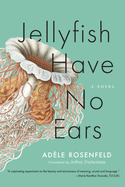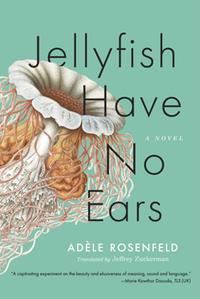
 Adèle Rosenfeld's Jellyfish Have No Ears is a strange, haunting story of sensory presence and absence, language and loss, relationships and choices. Translated from the French by Jeffrey Zuckerman, this first novel follows a young woman whose limited hearing has left her always straddling the experiences of the hearing and the deaf. Her progressive hearing loss eventually poses a choice between a cochlear implant and profound deafness. In a world she finds increasingly incomprehensible, Louise navigates work (in the French governmental bureaucracy, processing first birth and then death certificates), friendship (with the eccentric Anna, who views Louise's deafness as poetic), and a romantic relationship with a hearing man. She is accompanied as well by a dog, a soldier, and a botanist who deals in "miraginary" plants; these three characters are hallucinations or creations of Louise's imagination who offer valuable advice.
Adèle Rosenfeld's Jellyfish Have No Ears is a strange, haunting story of sensory presence and absence, language and loss, relationships and choices. Translated from the French by Jeffrey Zuckerman, this first novel follows a young woman whose limited hearing has left her always straddling the experiences of the hearing and the deaf. Her progressive hearing loss eventually poses a choice between a cochlear implant and profound deafness. In a world she finds increasingly incomprehensible, Louise navigates work (in the French governmental bureaucracy, processing first birth and then death certificates), friendship (with the eccentric Anna, who views Louise's deafness as poetic), and a romantic relationship with a hearing man. She is accompanied as well by a dog, a soldier, and a botanist who deals in "miraginary" plants; these three characters are hallucinations or creations of Louise's imagination who offer valuable advice.
"When someone can't make use of a particular sense anymore, the cortex reorganizes so that area of the brain is repurposed by the senses that person still has." Because her world contains less and less sound, Louise's vision is vibrant. Jellyfish is bursting with sensory descriptions, including sounds heard and missed, "the warmth of timbres, this soft sheen of wind, of color, of all sound's snags and snarls." Visual details are evocative and often surprising: "eyes as blank as an ice floe after an orca had gone by with a penguin in its mouth." The effect of this unusual perspective is riveting.
Louise ponders large, philosophical questions of whether she will still be herself if she agrees to an implant. With an implant, she's told, she won't hear like she did before, but a psychologist also asserts, "Your brain will have forgotten what 'before' means." She wonders if she needs sound to activate memory and whether "[s]ilence set free words and images held captive by language." She investigates the experiences of those "uprooted from their language" and creates for herself a "sound herbarium." In Zuckerman's translation, Louise's voice on the page is by turns stark, stoic, and dramatic. As those around her pressure her to take the implant or to embrace deafness, Louise reveals a strong personality: fiercely obstinate and attached to her vivid interior world.
A curious, thought-provoking, intensely mind-bending exploration of the loss of a sense and the potential richness as well as struggle of life with an invisible disability. Imaginative and spellbinding, Jellyfish Have No Ears is unforgettable. --Julia Kastner, librarian and blogger at pagesofjulia
Shelf Talker: This engrossing first novel illuminates an experience of hearing loss that is both frightening and beautiful, filled with surprising imagery.

